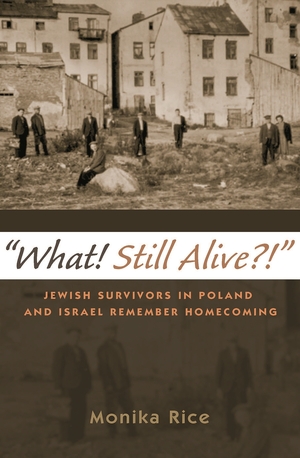"A fascinating, often very moving study of how Jewish Holocaust survivors remembered coming home at war's end to find only traces of annihilated Jewish communities. Historian Rice focuses on how Jewish and Israeli popular historical memory was formed through the process of recollection in thousands of written survivor testimonies collected in Poland and Israel in the immediate aftermath of the German defeat, the rise of a communist Poland, and the establishment of the Jewish State of Israel. . . . Rice explores the processes of memory of traumatic events among survivors. Very highly recommended."—Choice
"A serious, well-done study which makes an important contribution to the field of Holocaust studies. Even a bigger merit lies in the contribution it makes to the theoretical considerations of the extent to which the collective consciousness and the personal narrative affect, shape, and mold each other, and how the aspects of time and place impact the ways we are expected to remember."—Slavic Review
"A uniquely readable, remarkably affecting, and truly original text that is a must read for anyone interested in the history of Holocaust survivors, Polish-Jewish relations, and memory studies. It is certainly one of the best books on the subject in recent years."—AJS Review
"This carefully researched analytical study deserves the attention of scholars interested in the sensitive topic of memory and the forces impinging on its formation within the individual and among the collective. Its great merit lies in its critical focus and its sensitivity to the ways in which displacement affected the contours of memory as the traumatized struggled to give voice to a tragedy that pierced their hearts and despoiled the place they once knew as home."—Holocaust and Genocide Studies
"Rice has delved deeply into the complex processes that shape human recollection over time. Her research sheds important light on how social experience and political context contribute to the shaping of memory."—David Engel, Greenberg Professor of Holocaust Studies, New York University
Description
“What! Still Alive?!” offers a powerful and deeply affecting examination of the complex memories of Jewish survivors returning to their homes in Poland after the Holocaust. These survivors left unparalleled testimonies of their first impressions with the Jewish historical commissions from 1944 to 1950.
As many survivors found they were no longer welcome by their Polish neighbors, they chose to settle in the new state of Israel. Again, these surviving Jews left testimonies describing their postwar returns. In “What! Still Alive?!,” Rice investigates the transformation of survivors’ memories from the first account after their initial return to Poland and later accounts, recorded at Yad Vashem in Jerusalem between 1955 and 1970. Through close readings of these firsthand narratives, Rice traces the ways in which the passage of time and a changing geopolitical context influenced the survivors’ memories.
About the Author
Monika Rice teaches courses on the Holocaust, Jewish-Christian relations, and women’s spirituality at Seton Hall University, as well as Gratz College. She has received a number of prestigious fellowships and grants, and published articles, book chapters, and reviews in edited volumes and academic journals. Her research focuses on the inner lives of Polish Jews.
November 2017

